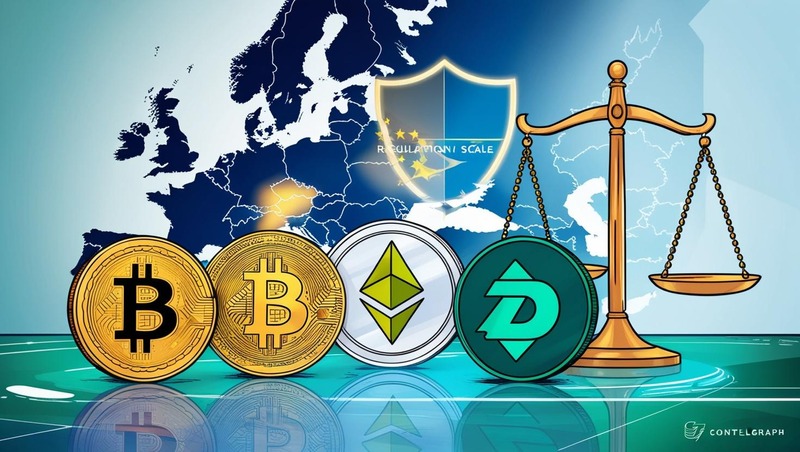The European Union is tightening its grip on cryptocurrency privacy. By 2027, under the new Anti-Money Laundering Regulation (AMLR), anonymous crypto wallets and privacy coins like Monero, Zcash, and Dash will be banned for use within regulated platforms.
🧾 What’s Changing?
The European Union is set to enforce major changes in cryptocurrency regulations by 2027, targeting privacy coins and anonymous crypto wallets. The new Anti-Money Laundering Regulation (AMLR) will ban crypto service providers, like exchanges and wallet providers, from handling transactions with privacy coins such as Monero, Zcash, and Dash. These coins, designed to protect user privacy, have raised concerns due to their potential use in illegal activities like money laundering and terrorism financing.
The AMLR also introduces strict Know Your Customer (KYC) and Anti-Money Laundering (AML) checks for transactions over €1,000, even for self-hosted wallets. Self-hosted wallets, which offer more privacy and control to users, will now face the same regulatory requirements as centralized exchanges. This means that all crypto transactions will be monitored, and user identities must be verified to ensure compliance with anti-money laundering standards.
While the EU aims to reduce financial crime, these changes have sparked concerns over privacy. Many crypto users value anonymity in transactions, and these regulations could undermine that. As the 2027 deadline approaches, crypto users and service providers will need to adapt to a new reality where privacy is limited in favor of regulatory compliance.
🔍 Why the Crackdown?
The European Banking Authority (EBA) has highlighted the risks associated with privacy coins and self-hosted wallets, especially concerning money laundering and terrorist financing. The EBA’s guidelines suggest that crypto firms should exercise heightened vigilance when dealing with these assets.
💱 Exchange Reactions
Crypto exchanges are facing significant challenges as the EU tightens regulations on privacy coins. One of the biggest players, Binance, initially announced plans to delist several privacy coins. The list is including Monero (XMR), Zcash (ZEC), and Dash (DASH), in markets like France, Italy, Spain, and Poland. This decision was made to comply with local Anti-Money Laundering (AML) and Know Your Customer (KYC) regulations. These are requiring greater transparency in transactions. The move sparked backlash from users who were concerned about the loss of financial privacy and the exclusion of privacy coins.
After receiving feedback, Binance reversed its decision for some of these coins, allowing them to remain available in select markets. However, the exchange still delisted specific privacy coins in Belgium due to local regulatory requirements. This highlights the balancing act exchanges must navigate—complying with regulations while maintaining user trust and keeping their platforms competitive. Exchanges must stay agile as regulations evolve and continue to adjust their policies to meet the demands of both regulators and users.
Other crypto exchanges, especially smaller platforms, are facing similar decisions. Some may fully comply with the EU regulations by removing privacy coins or adding stricter KYC/AML checks. Others might look for alternatives to protect user privacy while staying within legal boundaries. The regulatory landscape in the EU is forcing exchanges to rethink their strategies and make critical decisions on how they handle privacy coins, which will impact the future of privacy and decentralization in the crypto space.
⚖️ The Privacy Debate
The EU’s push to regulate anonymous crypto transactions has sparked a fierce privacy debate. Critics argue that banning privacy coins, like Monero and Zcash, undermines the core value of financial privacy in cryptocurrencies. Many users are drawn to crypto for the ability to make transactions without revealing personal information. Privacy is seen as essential to the decentralized nature of digital assets, and these new regulations threaten that principle.
Privacy coins were designed to protect user data by masking transaction details, such as the sender, receiver, and amounts. This feature appeals to individuals who prioritize confidentiality, whether for personal, security, or political reasons. However, the EU sees these privacy features as potential risks, making it easier for illicit activities to go unnoticed. The shift towards transparency aims to curb illegal use, but it raises concerns about privacy erosion.
Privacy advocates, including MEP Patrick Breyer, argue that these regulations violate fundamental rights. He stresses that financial privacy is a key part of economic freedom. If fully enforced, these regulations could set a troubling precedent for broader surveillance and tighter restrictions on personal privacy. The clash between security measures and privacy rights will shape the future of crypto regulation in the EU and globally.
🔮 What’s Next?
The EU’s new regulations on anonymous crypto wallets and privacy coins will not be fully implemented until 2027. This gives both the EU and the crypto industry time to adjust. However, it also raises questions about how the crypto landscape will change. The extended timeline is important because it suggests the regulations may be updated before full enforcement. This allows lawmakers and industry players to make adjustments as needed.
For crypto users and service providers, this period presents an opportunity to prepare for these upcoming changes. Exchanges and wallet providers will need to implement enhanced Know Your Customer (KYC) and Anti-Money Laundering (AML) measures to remain compliant. This could lead to a wave of innovation as crypto platforms work to balance compliance with user privacy concerns. At the same time, users may need to adopt new strategies for maintaining privacy, such as utilizing more traditional privacy-enhancing technologies or exploring decentralized finance (DeFi) platforms that may not be as heavily regulated.
The uncertainty in the coming years means crypto users, especially those who value privacy, must closely follow regulatory changes. While the EU’s position is clear, other regions may introduce their own regulations, creating a fragmented global crypto market. In this changing landscape, staying informed about new laws and emerging privacy technologies will be crucial. The next few years will bring both challenges and opportunities as the crypto industry adapts to evolving regulations.
🧠 Stay Informed
While the regulatory landscape is changing rapidly, there is still room for innovation in the crypto space.The EU’s focus on transparency may seem challenging for privacy, but it could spark new solutions that balance security and user freedom. The crypto industry is known for its creativity and resilience. It’s likely that new privacy-enhancing technologies or decentralized platforms will emerge to meet the needs of users who value anonymity.
4o mini
Looking ahead, the future of cryptocurrency remains exciting. As regulations evolve, they will shape the ecosystem, but they will also push the industry to grow in new directions. By staying informed and adaptable, both crypto users and service providers can navigate this changing environment and continue to thrive in a more regulated but innovative space. The road ahead may be challenging, but it’s full of possibilities.
For more insights into the evolving crypto regulations and their impact, stay tuned to reputable sources and consider engaging with the community to share perspectives and strategies.























